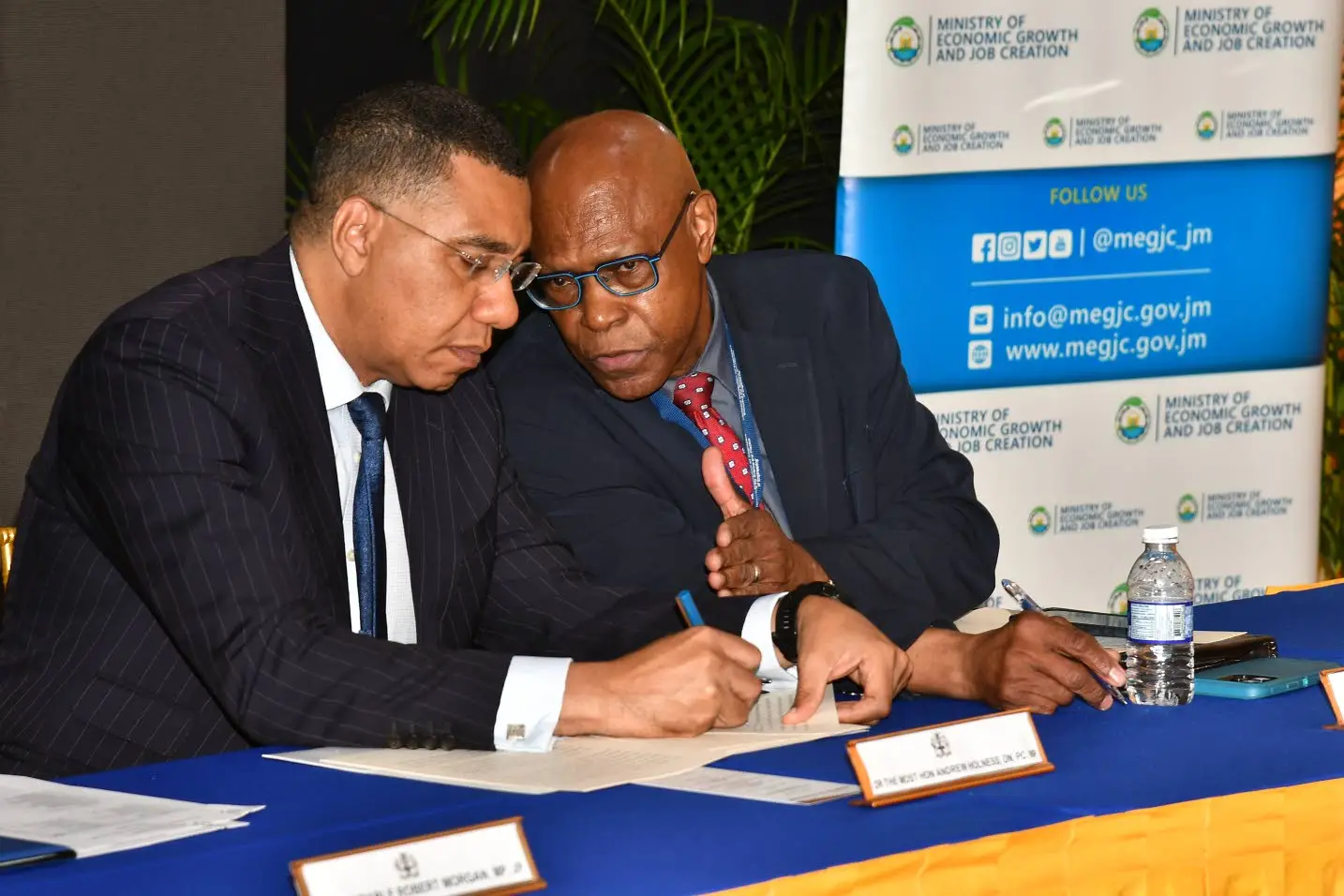
SPARK OF HOPE
Contract signed for $45-b road project, largest-ever in Jamaica’s history
Declaring that Jamaica is not alone as it relates to a crumbling road network due in part to lack of maintenance exacerbated by climate change, Prime Minister Andrew Holness on Thursday announced China Harbour Engineering Company (CHEC) as the selected bidder for the Government’s $45-billion Shared Prosperity through Accelerated Improvement to our Road Network (SPARK) project.
SPARK is the most ambitious and single largest-ever expenditure on the country’s road infrastructure. It is set to get under way this month and could not come earlier for frustrated road users who have had to put up with the bad road conditions daily.
That was a fact acknowledged by Holness as he addressed the signing ceremony for SPARK at Jamaica House.
Holness read from an article about the crumbling road network in Costa Rica, a country of more than five million people with per capita income in excess of US$16,000, compared to Jamaica’s US$7,000. He said that, unlike Costa Rica, that was seeking a loan to repair 77 roads, SPARK was being funded in its entirety by the Jamaican Government.
Of note is that SPARK includes a $5-billion component that will address the water infrastructure, namely the laying of pipes.
Separately on Thursday, Holness declared Jamaica’s deteriorating road network a national emergency and announced a $2-billion allocation for repair work to begin immediately on the main road network that has been damaged by persistent rain.
The aim is to return the roads to what he described as a “drivable condition”. He said the $2-billion is in addition to the $3-billion that is already being spent under the Relief Emergency Assistance and Community Help (REACH) programme.
“This will be done, following the law as well, using emergency procurement rules. We expect that the work will begin immediately,” the prime minister said.
He said the National Works Agency (NWA) has access to 21 grade one contractors and will use the various methodologies approved for emergency procurement to “engage them right across Jamaica to get the patching and reinstatement of roads to drivable conditions done”.
Meanwhile, he explained the bidding process for SPARK and how CHEC, which he noted has been operating in Jamaica for the past 10 years and was “essentially a Jamaican company”, was chosen. The prime minister outlined that through the international competitive bidding process, eight construction companies responded to the request for pre-qualification. There were two local and six international companies. “Only five companies, however, were successful at the end of this phase of the process,” Holness shared, adding that the request for bid proposal was sent to the five pre-qualified construction companies.
“Four of the five contractors submitted bid proposals for the four works packages at the end of August 2024. Two of those four did not make it past this stage and it was then down to two companies,” he disclosed.
“After the evaluation, and consistent with the Public Procurement Act and Regulations, we entered into negotiations with the highest-ranking bidder, China Harbour Engineering Company,” Holness said.
CHEC will undertake the work in four packages: Package 1: Kingston and St Andrew; Package 2: St Catherine and Clarendon; Package 3: Manchester, St Elizabeth, Westmoreland, and Hanover; and Package 4: St James, Trelawny, St Ann, and St Mary.
Package 1 will be undertaken at a cost of $9.2 billion; Package 2 is estimated to cost $9.9 billion; Package 3 is costed at $7.55 billion; and Package 4 is estimated to cost $9.4 billion.
Based on the contract signing, just over $36 billion will be spent on road infrastructure and $2 billion on the water component.
Holness said the construction contracts are scheduled for two years with an additional year for the defects liability period during which the contractor would carry out any repairs owing to defects.
The prime minister emphasised that SPARK was not a road patching or routine maintenance project, but rather a capital investment.
“The difference between regular maintenance and the capital investment is that the capital investment creates entirely new value that adds to your GDP,” he stated.
He pointed out that there are two distinct phases to SPARK — a local component, meaning a focus on community roads and a focus on main roads.
The NWA is responsible for managing the project and implementation of all works. It will be supported by teams of engineering consulting firms so that there are sufficient bodies on the ground to oversee the contractor’s works. This, the prime minister said, accounts for some $3 billion of the overall project.
SPARK will commence in the constituency of St Andrew Western in the Corporate Area, will move to St Elizabeth North Western, St Ann North Western, Manchester North Western then St Andrew East Rural, before being rolled out islandwide.

























